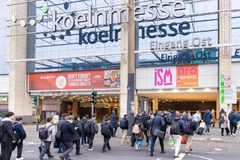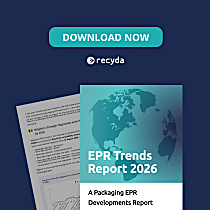New York’s EPR and packaging reduction bills lauded as game-changers in plastic pollution battle

11 May 2022 --- The US State of New York is introducing two new bills to combat over-packaging, poor recycling rates and litter issues, including an Extended Producer Responsibility (EPR) program requiring companies such as McDonald’s and Amazon to pay for the cost of packaging disposal and recycling.
The EPR bill incentivizes companies to gradually reduce their packaging by 50% over ten years by eliminating packaging or switching to reuse and refill systems. The bill would also eliminate known toxic substances from packaging, including PFAS.
Assemblyman Steve Englebright, chair of the New York State Assembly Environmental Conservation Committee, who introduced the bills on May 5, said yesterday that the proposals have a “good chance of passing” and a “good deal of momentum that is positive.” He added during a press conference on May 10: “We have plastic now in the bloodstream of many Americans. This [problem] we need to address.”

“It is troubling that after all these years, the problem of over-packaging has only gotten worse,” he continued in a press release. “There is more plastic packaging and more toxic packaging on the market than ever before. This is a problem across the state, but especially in Long Island, where we see plastic pollution entering the Atlantic Ocean. This bill shifts the fiscal responsibility for packaging away from the taxpayers. It will save tax dollars and help preserve our environment.”
Judith Enck, president of advocacy group Beyond Plastics, says, “this [Englebright bill] is the strongest packaging reduction bill in the nation. Adopting it would put New York on the map as a global leader in addressing the plastic pollution crisis.” An Oceana poll found 88% of New Yorkers are concerned about single-use plastic and support local and state policies to reduce it.
An Oceana poll found 88% of New Yorkers are concerned about single-use plastic and support local and state policies to reduce it.
Positive changes
The first bill, The Bigger Better Bottle Bill, would expand New York’s “highly successful” 40-year-old container deposit law to include non-carbonated beverages, wine, and liquor and raise the deposit from a nickel to a dime. Beyond Plastics says these changes would create jobs, reduce litter and increase recycling rates, as more consumers would return containers for the higher deposit.
The changes would also provide additional income to the many New Yorkers who salvage bottles and cans for recycling, a practice that about ten thousand low-income residents of New York City alone rely on as a source of income.
The second bill, Extended Producer Responsibility, utilizes the “polluter pays” principle, requiring companies to reduce their packaging and shoulder waste management and recycling costs rather than taxpayers.
The new bill follows a similar EPR program put forward by Governor Kathy Hochul in her proposed executive budget, which failed to win adoption with the legislature. Beyond Plastics describes the unsuccessful proposal as “much weaker” than the new bill.
The new EPR bill includes the following key features:
- Requires companies to gradually reduce their packaging by 50% over ten years, which can be achieved by either eliminating packaging or switching to reuse and refill systems.
- Requires companies to transition 90% of their remaining packaging over 12 years to be either recyclable, compostable, or made of recycled content.
- Eliminates known toxic substances, including PFAS, mercury, lead, and formaldehyde from packaging, making packaging safer for consumers and more recyclable.
- Transfers the responsibility for managing packaging waste from taxpayers to the companies that caused the problem, putting the economic burden where it belongs.
- Provides funding to local governments for waste reduction programs, recycling, and waste disposal through new fees, which are adjusted based on the environmental impacts of the packaging.
- Prohibits the burning of plastic and waste-to-fuel from being considered recycling, protecting communities from this new source of pollution.
- Includes accountability and enforcement mechanisms such as reporting and auditing requirements.
- Requires collection and reporting of data that will provide insight into local recycling and waste management systems.
Toxic waste mountains
According to a recent consensus study, the US generates more plastic waste than any other nation. Scientists have urged the country to combat plastic pollution through a nationally coordinated strategy. Last year, The Recycling Leadership Council found the US recycling system is at “breaking point,” with almost 10,000 different systems of recycling currently in use. The US reportedly generates the most plastic waste on Earth.
The US reportedly generates the most plastic waste on Earth.
Beyond Plastics claims that plastics recycling has been “an undeniable failure, achieving an anemic recycling rate of 5-6% in 2021. About 40% of virgin plastic production is used for plastic packaging, and about 30% of our waste stream consists of packaging. The obvious solution to this problem is to reduce plastic packaging.”
“New Yorkers understand the devastating and growing impacts of plastic pollution on our waterways and the need for swift action to address this issue. Just yesterday, Oceana released the results of a new poll finding that 88% of New York voters are concerned about single-use plastic products and support local and state policies to reduce single-use plastic. By reducing wasteful packaging and shifting the burden of managing packaging waste to producers and away from taxpayers, Chairperson Englebright’s EPR bill would offer real solutions to this problem and set an example for other states to follow,” says Brian Langloss, senior field representative for Oceana in New York.
Kate Kurera, deputy director of Environmental Advocates of New York, adds: “We have a solid waste and plastic pollution crisis and a sub-optimal recycling system. We need real solutions today to hold producers responsible for the life cycle management of their products, improve and increase recycling, support municipalities, reduce waste and plastics, close the door on false ‘chemical recycling’ solutions, and eliminate toxic chemicals.” The EPR bill would require companies – not taxpayers – to carry the cost of packaging disposal and recycling.
The EPR bill would require companies – not taxpayers – to carry the cost of packaging disposal and recycling.
Climate support
The EPR bill also aims to reduce air pollution, including greenhouse gas (GHG) emissions, minimize the release of plastic pollution into the natural environment, lower the demand for new natural resources, prolong the life of landfills, reduce unsightly litter, and ease financial burdens on taxpayers and municipalities currently covering the cost of packaging and paper waste management.
Plastics are widely seen as a major contributor to climate change. As of 2020, the US plastics industry is responsible for at least 232 million tons of CO2e gas emissions per year and on track to surpass the GHG emissions of the US coal industry by 2030.
Moreover, recycled plastics have been found to deliver significant carbon emission savings against virgin material.
“The cost of waste disposal, litter clean-up, and recycling is currently shouldered by taxpayers rather than the companies that make the decisions about packaging and profit from it. This will change upon adoption of Assemblymember Englebright’s legislation,” concludes Beyond Plastics.
By Joshua Poole











